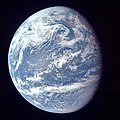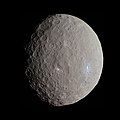Astrobiology Science and Technology for Exploring Planets (ASTEP) was a program established by NASA to sponsor research projects that advance the technology...
10 KB (1,363 words) - 20:48, 17 August 2024
integrates astrobiology research and training programs in concert with the national and international science communities. Although NASA had explored the idea...
12 KB (993 words) - 22:22, 2 August 2025
into space in 1974 Astrobiology – Science concerned with life in the universe Astrobiology Science and Technology for Exploring Planets – Former NASA program...
145 KB (15,724 words) - 01:17, 29 July 2025
Astrobiology (also xenology or exobiology) is a scientific field within the life and environmental sciences that studies the origins, early evolution...
113 KB (11,549 words) - 16:19, 3 August 2025
Solar System (redirect from Outer planets)
eight planets. Closest to the Sun in order of increasing distance are the four terrestrial planets – Mercury, Venus, Earth and Mars. Only the Earth and Mars...
226 KB (22,302 words) - 01:22, 4 August 2025
Fermi paradox (category Astrobiology)
Earth-like planets orbiting in the habitable zone. Many of these stars, and hence their planets, are much older than the Sun. If Earth-like planets are typical...
142 KB (16,073 words) - 02:04, 3 August 2025
Earth (redirect from Terra (name for the earth))
Life and Death of Planet Earth: How the New Science of Astrobiology Charts the Ultimate Fate of Our World. New York: Times Books, Henry Holt and Company...
218 KB (19,389 words) - 07:53, 29 July 2025
Titan (moon) (section Discovery and naming)
Titan: Exploring an Earthlike World. World Scientific. ISBN 978-981-270-501-3. Lorenz, Ralph; Mitton, Jacqueline (2002). Lifting Titan's Veil: Exploring the...
123 KB (12,088 words) - 03:00, 4 August 2025
All Tomorrows (category 2006 science fiction novels)
Matthias Determann's book Islam, Science Fiction and Extraterrestrial Life, which explores astrobiology and science fiction in the Muslim world. Following...
14 KB (1,736 words) - 20:06, 2 August 2025
Venus (redirect from Morning and Evening Star)
Venus is the second planet from the Sun. It is often called Earth's "twin" or "sister" among the planets of the Solar System for its orbit being the closest...
226 KB (20,506 words) - 03:18, 4 August 2025
Jupiter (redirect from Planet Jupiter)
fifth planet from the Sun and the largest in the Solar System. It is a gas giant with a mass more than 2.5 times that of all the other planets in the...
172 KB (16,464 words) - 00:58, 2 August 2025
Kepler-1649c (section Mass, radius and temperature)
2020-05-18. "Earth-Size, Habitable Zone Planet Found Hidden in Early NASA Kepler Data". Exoplanet Exploration: Planets Beyond our Solar System. Retrieved 2020-04-16...
10 KB (882 words) - 02:25, 20 June 2025
paradigms and practices. Planetary science or planetology, is the scientific study of planets, which include terrestrial planets like the Earth, and other...
52 KB (6,144 words) - 01:19, 30 June 2025
University, and Chris McKay of NASA Ames Research Center. The project was funded by the NASA Astrobiology Science and Technology for Exploring Planets program...
4 KB (392 words) - 19:42, 21 March 2025
Avi Loeb (category Scientists in technology assessment and policy)
(April 2012). "Detection Technique for Artificially Illuminated Objects in the Outer Solar System and Beyond". Astrobiology. 12 (4): 290–294. arXiv:1110.6181...
52 KB (5,293 words) - 07:40, 4 August 2025
has eight planets by the most restrictive definition of the term: the terrestrial planets Mercury, Venus, Earth, and Mars, and the giant planets Jupiter...
199 KB (20,938 words) - 17:02, 30 July 2025
Belton. Five panels focused on the inner planets, Mars, the giant planets, large satellites and astrobiology. The survey placed heavy emphasis on Mars...
17 KB (1,657 words) - 23:26, 1 March 2025
Kennda Lynch (section Astrobiology)
as a manuscript reviewer for JGR Planets, Geobiology, Astrobiology, Planetary and Space Science, as well as a peer reviewer for grants with the NASA Exobiology...
26 KB (2,824 words) - 02:35, 18 July 2025
invasion Astrobiology God-like aliens Principles of non-interference (e.g. Prime Directive) Message from space Living planets (both sentient and non-sentient)...
10 KB (768 words) - 16:20, 19 May 2025
Neptune (redirect from Planet Neptune)
(2017). "Comprehensive wide-band magnitudes and albedos for the planets, with applications to exo-planets and Planet Nine". Icarus. 282: 19–33. arXiv:1609.05048...
148 KB (14,393 words) - 14:07, 23 July 2025
" Hypothetical planets of the Solar System Nemesis (hypothetical star) Planets beyond Neptune Tyche (hypothetical planet) Five-planet Nice model 2017...
184 KB (19,718 words) - 15:25, 28 July 2025
Exoplanet (redirect from Extrasolar planets)
detection of planets near the star; thus, 85% of the exoplanets detected are inside the tidal locking zone. In several cases, multiple planets have been...
157 KB (16,913 words) - 02:10, 5 August 2025
define the term planet for the first time. Under the IAU definition approved on August 24, 2006, Eris, Pluto and Ceres are "dwarf planets", reducing the...
76 KB (6,463 words) - 12:30, 17 July 2025
refer to: Astrobiology Science and Technology for Exploring Planets, a former NASA program focused on planetary exploration Antarctic Search for Transiting...
305 bytes (66 words) - 19:32, 28 January 2022
Ocean world (redirect from Ocean Planet)
habitable zone of Earth-mass planets around 47 UMa: results for land and water worlds". International Journal of Astrobiology. 2 (1): 35–39. Bibcode:2003IJAsB...
55 KB (6,175 words) - 15:34, 30 June 2025
Centauri B, and was dubbed the closest exoplanet for a while before being disproven Astrobiology Extremely large telescope Exoplanet orbital and physical...
75 KB (8,393 words) - 16:34, 29 July 2025
SETI Institute (redirect from Search for Extra Terrestrial Intelligence Institute)
universe; the Center for Education, focused on astronomy, astrobiology and space science for students and educators; and the Center for Public Outreach, which...
13 KB (1,512 words) - 07:04, 20 July 2025
Extraterrestrial UFO hypothesis (redirect from Alien UFO technologies)
aliens) from other planets, or probes designed by extraterrestrials. The scientific community has shown very little support for the ETH, and has largely accepted...
52 KB (6,123 words) - 03:18, 29 July 2025
Space ethics (category Ethics of science and technology)
0891. ISSN 1531-1074. PMC 3698687. PMID 23095097. "Planets and Life: The Emerging Science of Astrobiology". Higher Education from Cambridge University Press...
24 KB (2,691 words) - 21:33, 15 June 2025
dwarf planets and planetary-mass moons to be planets, but since 2006 the IAU and many astronomers have excluded them from the roster of planets. Dwarf...
99 KB (9,084 words) - 08:01, 4 August 2025






















